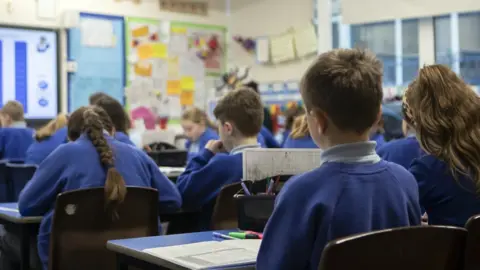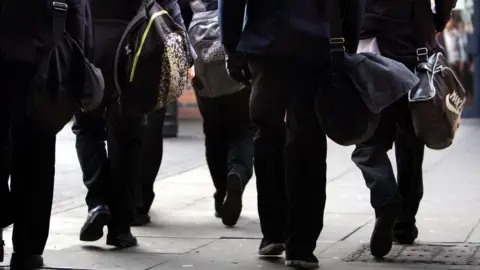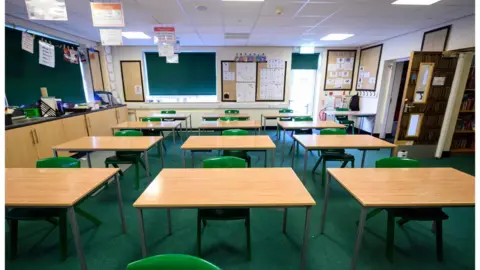Education spending on NI's disadvantaged pupils 'ineffective'
 PA Media
PA MediaThe Department of Education (DE) cannot demonstrate that almost £1bn of funding has improved the education of disadvantaged children.
That is according to a critical report from the Northern Ireland Audit Office (NIAO).
It said the educational gap between poorer and more affluent pupils increased as they got older.
The NIAO also warned that disadvantaged pupils were more likely to be negatively affected by the pandemic.
"The pandemic is likely to have a negative impact on the learning outcomes, mental health and well being of all children and young people but may have a greater impact on those pupils who were already disadvantaged," their report said.
Long-running funding
A previous report on the links between deprivation and education achievement pointed to academic selection favouring the better off.
Despite that detailed Executive Office report being published in 2017, DE have since appointed another expert panel to look at educational under-achievement.
The NIAO report looked specifically at how £913m of Targeting Social Need (TSN) and Sure Start funding had been spent since 2005.
The report is called Closing the Gap - Social Deprivation and links to Educational Attainment.
The DE provides schools with about £75m of TSN funding each year to give additional support to pupils from disadvantaged backgrounds.
Sure Start, meanwhile, is meant to help parents and children under the age of four living in deprived areas.
 PA
PAThe department spent more than £27m funding Sure Start programmes in 2020/21.
Free School Meal Entitlement (FSME) is the most common measure of deprivation used in education.
In 2020/21 there were 97,631 pupils entitled to free school meals - just over 28% of all pupils.
The NIAO said educational attainment, including that of pupils with FSME, had improved in recent years.
 The School Food Plan
The School Food PlanFor instance, almost half of FSME pupils achieved at least five GCSEs at grades A* to C including English and maths in 2018/19.
However, almost 80% of pupils not entitled to free school meals achieved at least those qualifications in 2018/19.
The NIAO said that meant the attainment gap between non-FSME and FSME school leavers had not changed significantly in the last 15 years.
'Lack of accountability'
Schools can spend TSN money on things like extra staff, pastoral care or equipment for additional educational needs.
The spending watchdog said there was a "lack of information and accountability" on how TSN money was spent.
For instance, only 6% of schools who received money in 2018/19 told DE how they had spent it to support pupils.
When the NIAO carried out its own survey, just over one in 10 schools said they were using the funding fully as intended.
The NIAO said that meant DE could not demonstrate that TSN funding was being used to help pupils from deprived backgrounds.
 PA Media
PA Media"There is no requirement for schools in receipt of TSN funding to spend it solely on supporting pupils from socially-deprived backgrounds," NIAO said.
"Only 11% of respondents to an NIAO survey of schools indicated that their school used TSN funding to support only pupils from socially-deprived backgrounds.
"As a result, the department does not know what schools are spending TSN funds on, nor how effective schools are in addressing under-achievement in pupils from socially-deprived backgrounds."
The audit office said it should be mandatory for schools to report how they spent the funding they received and that sanctions should be considered for schools who failed to do this.
The watchdog made some similar criticisms with regard to Sure Start funding.
It did say, though, that reporting on Sure Start projects had improved in recent years.
However, DE did not know what long-term impact participation in Sure Start had on a child's education.
The NIAO said factors like school leadership, classroom teaching, and parental and community involvement contributed to educational attainment.
"The department is unable to demonstrate the effectiveness of its two main funding interventions, accounting for almost £102 million per annum that is provided to address the educational attainment of pupils from socially-disadvantaged backgrounds," its report concluded.
"As a result of the issues identified in this report, we consider that the department is unable to demonstrate that value for money is being achieved in the allocation of these funds."
